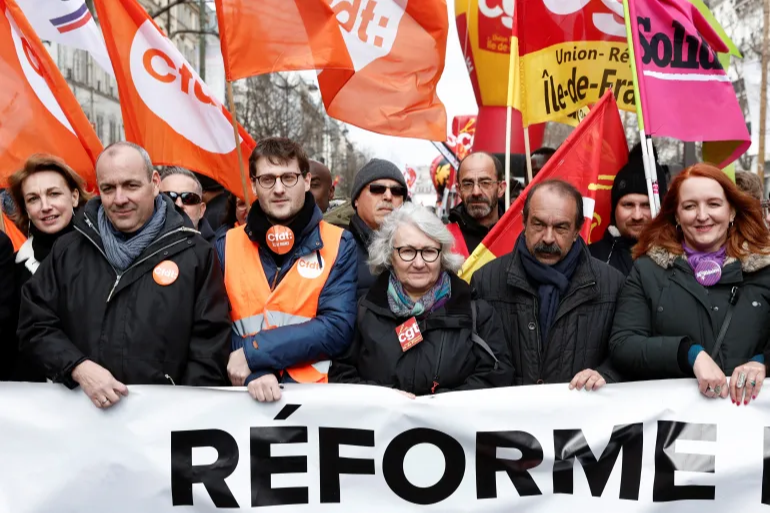
People protest against the French government's pension reform plan in Paris [File: Benoit Tessier/Reuters]
Paris, May 1 (RHC)-- May Day protests and strikes have taken over France, Italy and the Netherlands, with workers and labor unions demanding better government policies to safeguard their rights and meet their wage demands.
French President Emmanuel Macron faced nationwide protests in the country, with demonstrators denouncing his unpopular pension reform, which saw the retirement age increasing from 62 to 64 in the country. The legislation also requires people to work 43 years to receive a full pension, among other changes to the system. Macron, who says the reform is necessary for the future of France, has been met by boos, pot banging and heckles as he confronts citizens on walkabouts.
In the French capital, police were pelted with projectiles, ride-sharing bicycles were torched and bus stops smashed up just as the union-led march got underway from the central Place de la Republique.
Unrest also erupted in Lyon, where several vehicles were set ablaze and some business premises were trashed, television images showed. In Nantes in western France, a fire blazed in front of a local administration building.
Unions say that while they will respect the Constitutional Council’s decision on passing the pension reform as a law, they will continue protests to get Macron to withdraw the measure. More than one million people continued marching through towns and cities across the country on May 1st.
Meanwhile, in Italy, Prime Minister Giorgia Meloni also faced demonstrations from labour unions who called on her government to increase wages and reform the country’s tax policy. Meloni’s government unveiled a labour package amid the protests on Monday, rolling back anti-poverty subsidies introduced four years ago. Italy’s INPS social security agency says the citizens’ revenue benefited four million people last year, with an average monthly subsidy of 550 euros.
The government says it costs too much, at around eight billion euros ($8.8 billion) last year, and discourages able-bodied people, especially youths, from looking for jobs. “We are reforming the citizens’ income to make a distinction between those who are able to work and those who aren’t,” Meloni said in a statement.
The leader of the country’s most far-right coalition since World War II said the “citizens’ income” benefits would be replaced by a more limited “inclusion cheque” for qualifying households.
The new inclusion cheques will be capped at 500 euros a month, though further aid will be offered for households with elderly or handicapped members, or those that do not own their homes.
Meloni’s government also made it easier for companies to hire on short-term contracts – which unions blast as keeping employees in precarious economic situations – while promising tax breaks to firms hiring people benefiting from the new inclusion cheques.
International Worker's Day protests also took over the Netherlands, which saw unions demanding higher wages. Due to inflation, employees of the largest labor union in the Netherlands, FNV, had offered its employees a wage increase of 3 to 7 percent this year, followed by a 5 percent increase next year and automatic price compensation with a maximum of 5 percent from 2025 on. FNV warned that strikes would continue on Tuesday if their demands were not met.

